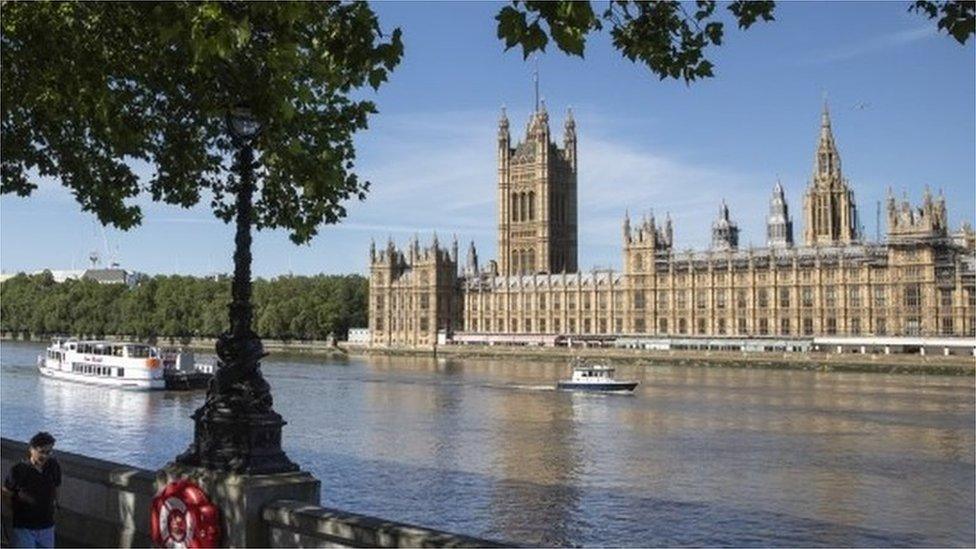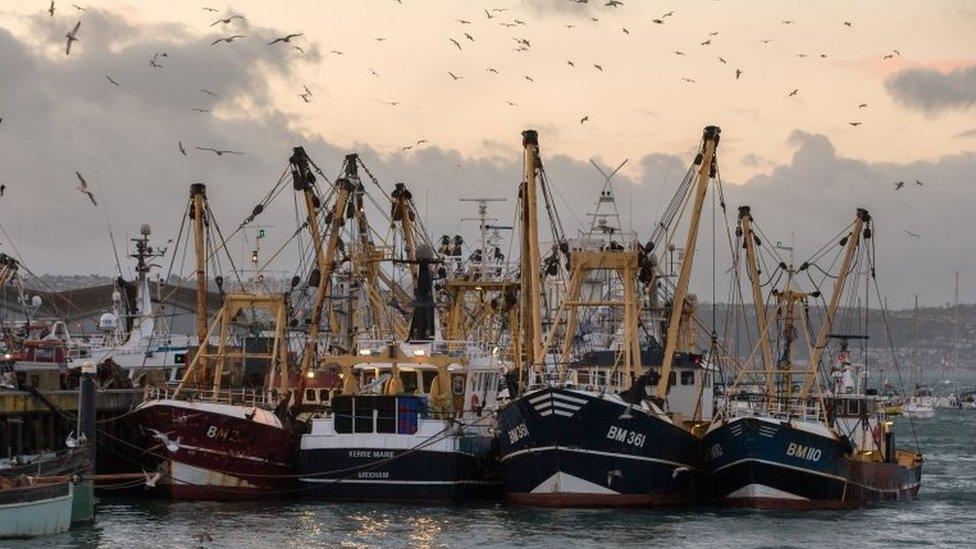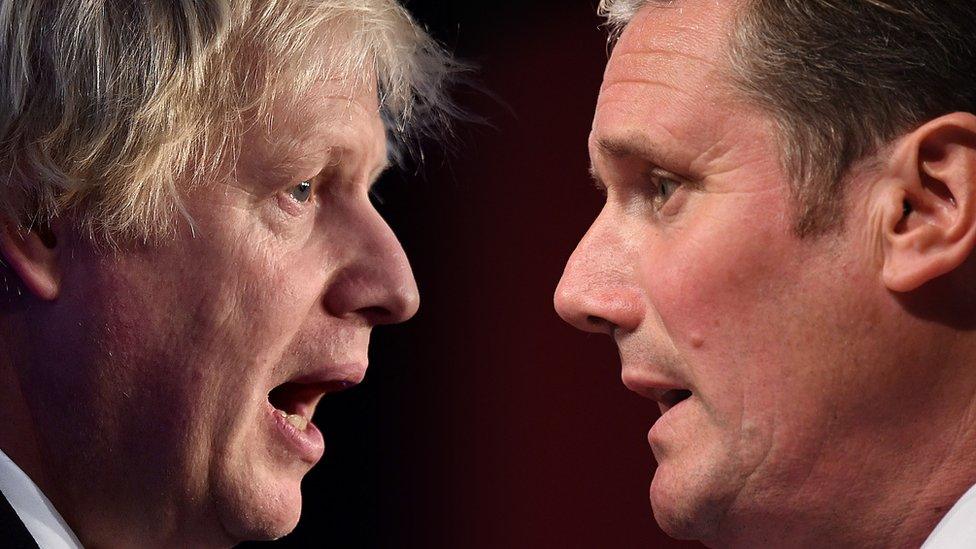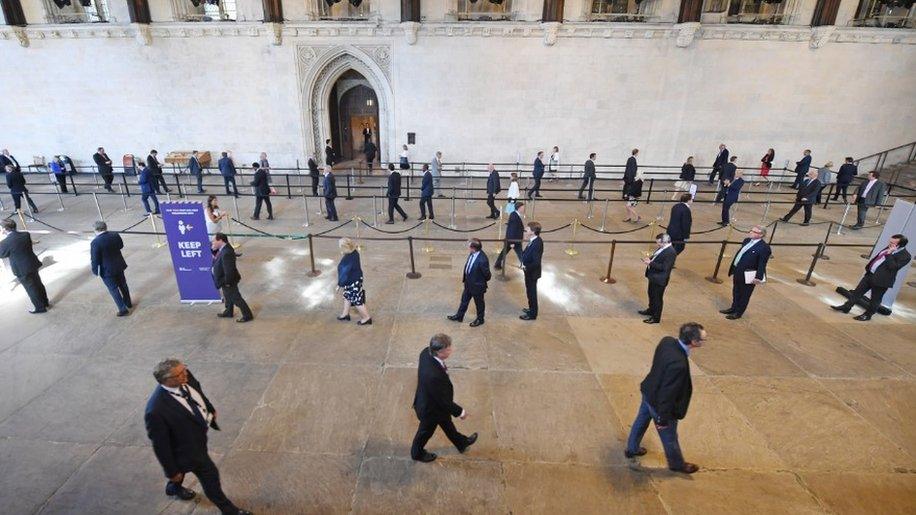The week ahead in Parliament
- Published

Non-Covid and non-Brexit controversies loom in the Commons agenda, as MPs debate the actions of Communities Secretary Robert Jenrick and the rules for their new independent complaints system to address harassment and bullying claims.
And there's also a whole lot of law-making going on, with MPs processing bills on extradition and medical regulation, while in the Lords the government will be hoping to fend off peers intent on re-writing sections of the Fisheries Bill.
Now able to vote again, the Lords may be set to make a habit of passing unwelcome (to ministers) amendments to legislation, because there will be plenty to come - Huawei, anybody?
And, of course, there will doubtless be plenty of ministerial statements about pandemic issues, dropped into the agenda at the last moment, plus lots of interesting committee action.
Monday 22 June
The Commons opens (14:30) with Education Questions - after which the usual post-weekend clutch of ministerial statements and urgent questions will likely be heard.
The main legislative business is the Second Reading debate on the Extradition and Provisional Arrest Bill, heavily amended in the House of Lords. Will the government seek to remove the safeguards added by peers to prevent extradition deals being struck with human rights-abusing regimes.
The adjournment debate, led by Conservative Neil Parish, is on BBC regional politics coverage.
On the Committee Corridor, Public Accounts (14:30) takes evidence from highest medical, health and social care officials in the land on "Readying the NHS and social care for the COVID-19 peak".
A battery of top civil servants takes part, including the regular double act of Sir Chris Wormald, permanent secretary at the Department for Health and Social Care, and Sir Simon Stevens, chief executive of NHS England.
In the Lords (14:30) questions to ministers range across insulating the UK's existing housing stock, to meet the 2050 net-zero emissions target, ensuring seaside resorts can respond to increased demand for UK holidays and the total cost of the Independent Inquiry into Child Sexual Abuse.

Then another major piece of Brexit legislation, the Fisheries Bill, reaches its Report Stage. This is the point in its legislative life-cycle where peers push amendments, and there are plenty.
As ever, the most dangerous to the government are the ones with cross-party support, so look out for amendments with backers from several parties.
And watch for names like Lord Krebs, the crossbencher and former chairman of the British Food Standards Agency, who has an amendment changing the definition of sustainability and making it the main objective of the bill.
Labour's Baroness Jones of Whitchurch leads an amendment introducing a requirement for a minimum percentage of fish caught in UK waters to be landed at UK ports.
Lord Grantchester, also a Labour frontbencher, has an amendment reserving a baseline share of quota for new entrants and small fishing boats.
And the Lib Dems Lord Teverson has an amendment requiring the gradual introduction of video monitoring of all fishing boats across England.
There are also some interesting Conservative names cropping up on the amendment paper: Lord Randall, the Conservative former whip; Baroness MacIntosh, the former chair of the Commons Environment, Food and Rural Affairs Committee; and Lord Lansley, the former Health Secretary.
The first day will focus on the sections dealing with fisheries objectives, statements and management plans, access to British fisheries and regulation of foreign fishing boats. The second and final Report Stage day is on Wednesday.
Tuesday 23 June
MPs begin (11:30) with Health and Social Care Questions.
The day's Ten Minute Rule Bill, from the Conservative Jonathan Gullis, is on the desecration of war memorials. He will propose that people accused of damaging them can be charged with criminal damage, even if the cost of the damage is below £5,000. And that they should be tried in the Crown Court, which has the power to impose more severe sentences that the magistrates' court
Then MPs polish off the remaining stages of consideration of the Medicines and Medical Devices Bill, which deals with the post-Brexit regulation of human medicines, veterinary medicines and medical devices.

And that is followed by a motion from the Leader of the House, Jacob Rees-Mogg, under which the Commons "reaffirms its commitment to the Independent Complaints and Grievance Scheme (ICGS) and to tackling bullying, harassment and sexual misconduct on the part of anyone who is or was a member of the parliamentary community".
The motion goes on to accept the recommendation in the report by Dame Laura Cox QC on the bullying and harassment of staff, that complaints against MPs should be determined by an independent body and to agree the House of Commons Commission's proposal to establish an independent panel of experts - and adds that all MPs are expected to cooperate with the panel's work and comply with its findings.
There has been criticism that the proposed system leaves the final say on sanctions against MPs to a vote in the House, following a one-hour debate, which opens up the possibility of a Commons repeat of the Lords fiasco over Lord Lester, where a recommendation for his suspension was rejected by peers.
And the very thought of a debate opens up the prospect of MPs elliptically questioning the findings. The fear is that this will have a chilling effect.
A second motion then sets up an eight-member panel to rule on harassment and bullying complaints and to hear any appeals. Among other things, it says its members cannot be MPs or peers and that any member who later became an MP or peer would automatically cease to be a member of the panel.
On the virtual Committee Corridor, Public Administration and Constitutional Affairs (09:30) takes evidence from senior officials at the Electoral Commission on their work; this could be entertaining because the commission is not popular with MPs, who criticise it for being over-bureaucratic and ineffectual.
The Digital, Culture, Media and Sport Committee (09:30) quizzes Dame Melanie Dawes, the new boss of the broadcasting regulator Ofcom. The government has announced it is "minded" to make Ofcom the online harms regulator, so she will face questions about her expanded remit. The session will also cover, digital inclusion and infrastructure and public service broadcasting.
Environment, Food and Rural Affairs (15:00) continues its inquiry into Covid-19 and food supply, focusing on the impact of the lockdown on restaurants, cafés and pubs, with witnesses from UK Hospitality, Just Eat and the Food Foundation.
In the Lords (11:00) ministers face questions on illegal fly-tipping and reducing the number of introductions of new peers
Then peers deal with the Report Stage and Third Reading debates for the Corporate Insolvency and Governance Bill - an emergency measure to give temporary protection from bankruptcy and debt collection processes to companies hit by the pandemic. Labour has an amendment down to give ailing companies more time to come up with a rescue plan.
Wednesday 24 June
The Commons begins (11:30) with half an hour of Northern Ireland Questions, followed by Prime Minister's Question Time - which was rowdy enough last week to begin to resemble its pre-pandemic self.
The day's Ten Minute Rule Bill, from Labour's Rupa Huq, would restrict demonstrations in the vicinity of abortion clinics - something which has been an issue in her constituency.
The main debates are on two Labour Opposition Day motions - first on the row over planning permission for the development of Westferry Printworks in east London, and Housing and Communities Secretary Robert Jenrick's involvement.
This looks like quite an old-fashioned examination of the conduct of a minister, with lots of questions around the timing of various decisions and notifications to civil servants, the answers to which can then be considered against the requirements of the Ministerial Code.
And while Mr Jenrick is the focus of the debate (he was much criticised for refusing to answer in person an urgent question in the Commons), there is bound to be plenty of probing to see whether 10 Downing St had a role in the planning decision at the heart of the affair.
The second Labour motion is on health - no text was available at the time of writing.
Finally, the adjournment debate on the protection of UK food standards may mark the start of a trend, with rural Conservatives putting down markers about the opportunities and the potential impact of free trade for their farmers. In this case it's the Scottish Conservative John Lamont. I doubt he will be the last.
It's a busy day for select committees, with Home Affairs (09:15) taking evidence on the government's plans for a new immigration system and then questions the National Police Chiefs Council on disproportionate use of tazing and stop and search against BAME communities.
Northern Ireland (09:30) focuses on the government's proposals for addressing the legacy of Northern Ireland's past with Judith Thompson, the Commissioner for Victims and Survivors.
The Treasury Committee (14:30) has a session on the work of the Debt Management Office, and Women and Equalities (14:30) continues its inquiry "Unequal impact? Coronavirus, disability and access to services", with evidence from a series of disability groups
In the Lords (11:00) former Education Secretary Lord Blunkett has a question on ensuring school closures do not have an unequal impact on the education outcomes of the most disadvantaged pupils, and there are questions on stocks of PPE for a potential second wave of Covid-19, and the government's future data strategy
Then peers return to the Report Stage consideration of the Fisheries Bill (see above). They will focus on the sections dealing with access and licensing: offences and consequential amendments, fishing opportunities, discard-prevention charging schemes, grants and charges, and the powers given to ministers to make further provision.
Thursday 25 June
The Commons opens (09:30) with 40 minutes of Environment, Food and Rural Affairs Questions, followed by mini-question times for the MPs who speak for the Church Commissioners and House of Commons Commission and Parliamentary Works Sponsor Body and Public Accounts Commission and Speaker's Committee on the Electoral Commission.
Then come two Petitions Committee debates, with MPs considering public petitions on recognition and reward for health and social care workers and on support for UK industries in response to Covid-19.
More than 200,000 petitioners have signed parliamentary petitions relating to recognising our health and social care workers, while more than 500,000 British citizens and UK residents have signed parliamentary petitions calling for greater support for UK industries in response to the Covid-19 pandemic.
On the Committee Corridor, Scottish Affairs (14:30) continues its Coronavirus and Scotland inquiry.
The Business Committee (09:30) holds the first evidence session for its inquiry on post-pandemic economic growth, with an overview from academics.
In the Lords (11:00) question time includes a rare episcopal outing, with the Lord Bishop of Gloucester asking about working with faith communities to address violence against women. There are also questions on television gambling advertising and the UK's participation in the Erasmus+ programme.
The main legislative business is the Second Reading the Sentencing Bill. his is a Law Commission bill which tidies up the tangled and contradictory law on sentencing offenders - although the phrase "tidies up" rather downplays the scale of the changes it proposes.
It also clears the way for the new sentencing code intended to provide greater clarity for the courts. Law Commission bills are technical reforms proposed by legal experts, and are dealt with under a fast-track procedure.
Friday 26 June
Neither House sits.
- Published10 June 2020

- Published3 June 2020

- Published3 June 2020
